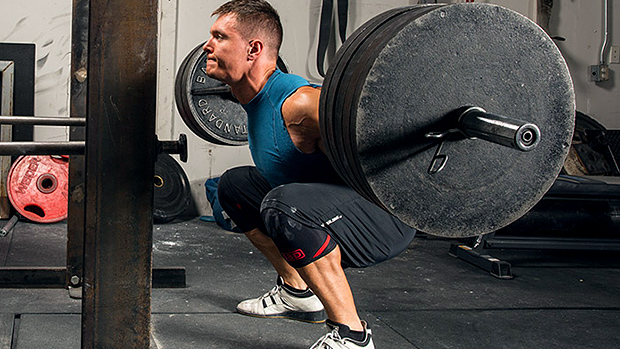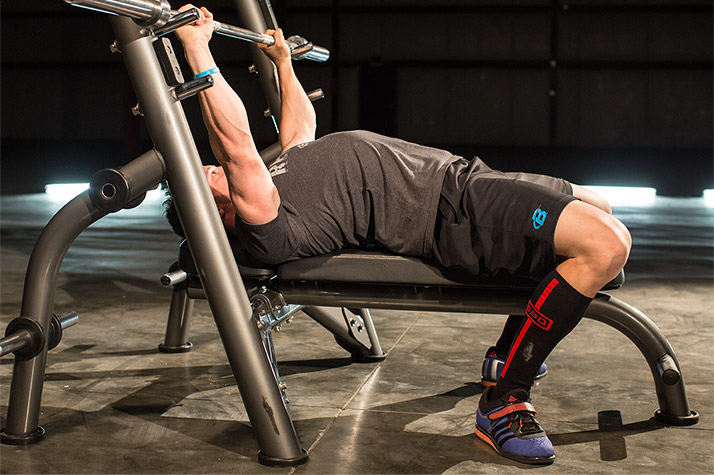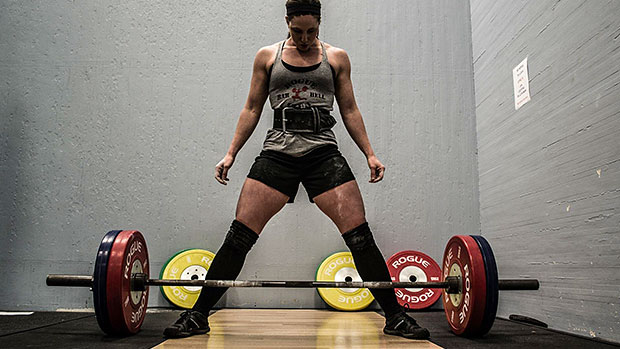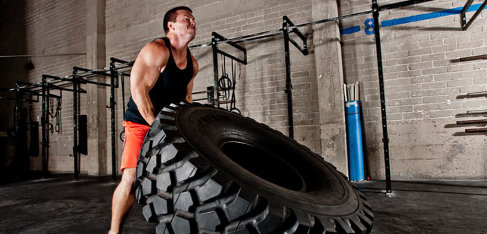I train to gain strength and practice natural powerlifting. How much weight should I lift? If you've asked yourself this question, here are some realistic stats for the squat, deadlift, and bench press. Do you train in the gym and are you interested in gaining strength ? Do you practice powerlifting ? Do you want to know how strong you can aspire to be in the squat , bench press and deadlift ? Then this article is for you, reader. Do not miss it! ;)
Meet Human Strength: How Much Weight Should You Lift?
Every day, natural lifters are bombarded with videos of professional bodybuilders and powerlifters.
They are capable of pulling massive weights like superheroes from another world. Few realize that the marks of these professionals are impossible to obtain by individuals who do not use anabolic steroids.
This is a fact of life and yet many continue to suffer from a clear disillusionment that needs to be destroyed.
Today, I would like to present to you what could be considered realistic human strength benchmarks for the squat, bench press and deadlift in naturals.
BEWARE, the article intends to give a general and average vision that does not have to coincide with the personal experience of each person. Your natural powerlifting marks and records may be higher or lower, but this will give you a rough and fairly realistic idea of what might be considered good strength levels for a natural lifter. Remember that strength and body weight are related, so in general, more muscle + weight = more strength.
How much weight should I squat as a natural powerlifter?
The squat can be a great exercise, but not everyone is born to move heavy weights. People with short femurs have an advantage over tall lifters with long legs. How much weight should I lift if I am a beginner?
For people with average genetics, lifting 1.5 times your own body weight or a little more is the point after which things really get tricky. Any achievement above that can be considered a good mark for a natural.

Let's take as an example that you are a natural of average size of about 75 kg. If you can lift 112.5 kg (250lbs) for 6-8 reps with good form, then consider yourself lucky. Bodyweight strength will be pretty good.
If your femurs are really short and you have a stocky build, you would be able to reach 2x your body weight or even more. This means that if you weigh 75kg, you might one day be able to move 150kg for a full set of 6-8 reps.
Lastly, we have these guys with the unfavorable genetics. If you fall into this category (long legs, short torso, and ectomorph), don't feel bad. Michael Jordan is with you, friend. For these individuals, the squat is going to be a difficult lift. That's why your marks will be a little lower. However, you may be able to achieve a decent squat. It will simply take you longer to gain the necessary muscle power .
How much should I bench press?

Let's be clear for a moment. The question that has brought you this far is how much should I bench press . The bench press is why you're reading this. You don't care as much about human strength in the squat and deadlift. You want to know how much you'll be able to bench press.
So how much force can a person do in this exercise? We'll say that lifters with "Tyrannosaurus Rex arms" and broad shoulders make the best press benchers. This structure shortens the range of motion and naturally allows the lifter to move more weight. And not only that, but also the recovery from training is faster.
How much weight should I lift? Normally, an average person would be able to lift their own body weight or something else for a full set. This means that if you weigh 75kg and have average genetics, things are going to get really tough once you hit 75kg for 6-8 reps. Any mark that goes beyond that is going to take more effort. You don't even expect the average person to ever lift above 1.5x their body weight in natural powerlifting . In the case of our 75kg natural lifter, this would be 112.5kg.
If you're one of the lucky few, you might be able to hit just over 1.5x your bodyweight or even come close to lifting twice your bodyweight .
How much weight should I carry in the gym? If you weigh 75kg and have good bench press genetics , doing 112.5kg for a set of 6-8 reps is where you'll hit the ceiling. However, regardless of whether you've been blessed with favorable genetics, accomplishing the feat will take a significant amount of time. Strength in the human body develops very slowly, remember that!
In the end, we have the lanky ones with long gorilla arms, skinny wrists, and naturally narrow shoulders. For these guys, bench pressing is a bad activity for their ego. Don't feel bad, guys. The entire NBA is in your situation.
Most individuals who fall into this category are deltoid and tricep lifters who use a close grip. This increases the range of motion even more. If you fell into this category, you would be able to build muscular strength to 1x your body weight with relative ease. One day you could, achieve 1.5 x your body weight, but getting there is going to be crazy.
Who knows... maybe if you ignore everything else in life you might even exceed these limits of muscle strength gains ... The bench press just doesn't go down well with tall guys with long arms. If you want to lift something really heavy, you will have to weigh more than 130 kg to compensate for your levers.
How much should I deadlift?
How much strength can a person have? As with the other lifts, the deadlift is also favored by a specific body type.
If you have really long arms, consider yourself a lucky monkey. You will have it easy to take off the bar from the ground. In addition, your recovery will be shorter, something that will not be the case for people with short arms and legs.
If you are someone of average proportions, you will be able to easily lift 2x your body weight . You could even go further than that.
 However, that will take you a lot of time and effort and it's not going to be easy at all.
However, that will take you a lot of time and effort and it's not going to be easy at all.
How much strength can a human have? People with long arms, a naturally strong spine, and long fingers (for better grip) will be able to lift over 2x bodyweight in their first year of training. These guys could eventually take off up to 3x x body weight with the help of good programming and dedication. If you're a 75kg lifter and cut out for the deadlift, you might be able to pull 200-225kg naturally, or maybe even more in extreme cases. This would be an excellent strength to body weight ratio .
The deadlift , unlike the squat or bench press , does not require the lifter to have a large amount of muscle mass, since their body is not supporting the bar. In this exercise, you pull on the bar. For that reason, many people see deadlifting as a natural's chance to shine.
Unfortunately, or not, people with T-Rex arms have it harder when it comes to deadlifting. Their range of motion is too long. On top of that, having short arms forces you to bend more and puts more stress on your lower back.
If you're part of the T-Rex-armed crew, you might be able to achieve the marks of those with average genetics, but the process will take longer. Don't feel sad, friend. Because if that's the case for you, you'll probably be a good bench press lifter. Whether you like it or not, that's the way things are.
Did you find it interesting? We're not leaving yet! If you want, you can stay to read a list of frequently asked questions about strength training .
Frequently asked questions about building muscle strength as a natural powerlifter
Have you set out to develop muscle strength and reach your natural limits in powerlifting ? So, surely you have asked yourself some of the following questions.
How much weight should I lift if I weigh 70 kilos? What if I weigh 60 kilos?
There really is no weight you should be lifting . Every natural powerlifter is different and has unique characteristics.
Absolute strength is highly dependent on genetics, the age of the lifter, the levers held for a given exercise, or body weight.
For this reason, do not pay attention to what other people of your same weight lift, because their circumstances and characteristics will be different from yours. Check that you are making progress in your weights. If your strength improves from year to year, you're on the right track.
In any case, you should know that increasing muscle strength depends largely on body weight. Here you have an estimation table with several examples of weight. Please note that this estimate is for men.
| Beginner | Intermediate | Advanced | |
| How much weight should I lift if I weigh 52 kilos? | - Squat (1.2 x body weight): 62, kg - Deadlift (1.5 x body weight): 78 kg - Bench press (0.9 x body weight): 48 kg | - Squat (1.5 x body weight): 78 kg - Deadlift (2 x bodyweight): 104 kg - Bench press (1.1 x body weight): 57 kg | - Squat (2 x bodyweight): 104 kg - Deadlift (3 x bodyweight): 156 kg - Bench press (1.5 x body weight): 78 kg |
| How much weight should I lift if I weigh 60 kilos? | - Squat (1.2 x body weight): 72 kg - Deadlift (1.5 x body weight): 90 kg- Bench press (0.9 x body weight): 54 kg | - Squat (1.5 x body weight): 90 kg - Deadlift (2 x bodyweight): 120 kg - Bench press (1.1 x body weight): 66 kg | - Squat (2 x bodyweight): 120 kg - Deadlift (3 x bodyweight): 180 kg - Bench press (1.5 x body weight): 90 kg |
| How much weight should I lift if I weigh 70 kilos? | - Squat (1.2 x body weight): 84 kg - Deadlift (1.5 x body weight): 105 kg - Bench press (0.9 x body weight): 63 kg | - Squat (1.5 x body weight): 105 kg - Deadlift (2 x bodyweight): 140 kg - Bench press (1.1 x body weight): 77 kg | - Squat (2 x bodyweight): 140 kg - Deadlift (3 x bodyweight): 210 kg - Bench press (1.5 x body weight): 105 kg |
| How much weight can I lift if I weigh 89 kg? | - Squat (1.2 x body weight): 107 kg - Deadlift (1.5 x body weight): 134 kg - Bench press (0.9 x body weight): 80 kg | - Squat (1.5 x body weight): 134 kg - Deadlift (2 x bodyweight): 178 kg - Bench press (1.1 x body weight): 98 kg | - Squat (2 x bodyweight): 178 kg - Deadlift (3 x bodyweight): 267 kg - Bench press (1.5 x body weight): 134 kg |
You already know how much I should lift according to my weight . With patience and practice, you will be able to reach the intermediate or advanced marks, which are pretty good.
How much strength can a human being have?
First of all, it should be clarified that the highest strength records in the world have been obtained by lifters who used exogenous aids (doping substances) or special powerlifting equipment (suits that give more strength). Therefore, it is not the same to consider how much strength a human being can have with certain "helps" than in a completely natural way.
So, what figures can serve as an estimate? The first thing we notice when looking at the steroid-free federation records is that the following lifts are extremely difficult to pull off:
600 pound (270 kg)
squat 400 pound (180 kg) bench
press 650 pound (295 kg) deadlift
We can safely say that if you hit these numbers, you'll be moving into elite territory for a natural lifter . Also keep in mind that it's nearly impossible to reach 2,000 pounds of total powerlifting strength as a natural athlete (lifting 2,000 pounds between three moves). Only a small handful of natural lifters have performed this amazing feat.
Let's look at the world records in the most popular power lifts. Keep in mind that it is very likely that anabolics were used to achieve the following marks:
Men:
- RAW bench press (shirtless): 355 kg by American Julius Maddox in 2021.
- Equipment bench press (shirt): 599 kg by Jimmy Kolb in 2022.
- Squat only with knee pads: 490 kg by the American Ray Orlando Williams in 2019.
- Squat with bandages: 525 kg by the Russian Vlad Alhazov in 2018.
- Squat with equipment (suit and bandages): 595 kg by the American Nathan Baptist in 2021.
- RAW deadlift (without suit or straps): 460.4 kg by Icelandic Benedikt Magnússon in 2011.
- Deadlift with equipment (suit and straps): 501 kg by Icelandic Hafþór Júlíus Björnsson in 2020.
- RAW sumo deadlift (without suit or straps): 487.5 kg by American Danny Grigsby in 2022.
- Press military: 212.5 kg by Lithuanian Žydrūnas Savickas.
- Clean and jerk: 267 kg by Georgian Lasha Talakhadze in 2021.
- Snatch: 225 kg by Georgian Lasha Talakhadze in 2021.
Women:
- RAW bench press: 207.5 kg by American April Mathis in 2016.
- Equipment bench press (shirt): 280 kg by American Rae-Ann Coughenour-Miller in 2022.
- RAW squat without bandages: 279 kg by the American April Mathis in 2011.
- Squat with equipment (suit): 387 kg by the American Becca Swanson in 2005.
- RAW deadlift (without suit or straps): 305 kg by American Becca Swanson.
- Clean and jerk: 187 kg by the Chinese Li Wenwen in 2021.
- Snatch: 148 kg by the Chinese Li Wenwn in 2021.
This list gives us an idea of how much force a person can exert , although it cannot be guaranteed that doping substances have not been used to achieve these records.
How much do natural lifters move in powerlifting?
Many of us want to know how much weight the strongest natural lifters are able to powerlift . However, this is very difficult to determine, since you can never be 100% sure that a person does not use doping substances. Let's take an athlete from the "pre-steroid era" as an example. His name is John Davis . For his prime, it is unlikely that steroid use was widespread. The records of this strong man were 250 kg x 3 repetitions in the squat, 193.2 kg x 1 in the bench press, 320.45 kg x 1 in the deadlift and 170 kg in the clean and jerk. He weighed 105.9kg when he competed (1937-1956), so he lifted his body weight 2.5x in squat, 1.8x in bench press and 3x in deadlift.
We will also be able to see two examples of current lifters who, given their long history, could perfectly be natural powerlifters .
- Jorge Pérez Córdoba : Spanish powerlifter weighing 75 kg with marks of 145 kg in bench press, 230 kg in squat and 300 kg in deadlift.
 |
| Jorge Perez |
- Jesús Varela : Spanish press bencher weighing 85 kg, capable of lifting 225.5 kg on the bench press.
 |
| Jesus Varela |
Both athletes present an achievable steroid-free physique .
How much weight should I lift if I am 14 years old?
If you're 14 years old and in the gym, you're probably excited to get stronger. You shouldn't worry too much about the weight you move at this age. Instead, try to learn the correct technique in all exercises. If you are just starting out in the gym, you have surely seen people moving heavy weights. You admire the strongest and would like to be like them. Don't be in a hurry! Those people who lift so much weight have been training strength for a long time. You must have patience, with time and following the correct nutrition, you too will become very strong.
How much weight should I lift if I am 16 years old? What if I am 17 years old?
If you are already a boy between 16 and 17 years old and you do not have health problems, you can go looking for some goals for your age. Aim for the following milestones: 15 reps with 30kg bench press, 15 reps with 40kg squat, and 15 reps with 50kg deadlift (weights are counting bar).
Hitting these weights and reps is a good goal to start with. From here, you can improve to reach more ambitious goals. We also recommend being able to do at least 10 pull-ups . You already know how much weight I should lift if I'm 17 years old ; now, you just have to go for it!

How much force can one person apply?
The world records in the best-known strength exercises to date have been 599 kg in the bench press, 595 kg in the squat and 501 kg in the deadlift. Weightlifting records have been 267 kg in the clean and jerk and 225 in the snatch. This gives us an idea of the force that humans have been able to apply to date.
Strength is closely related to a person's body mass or weight. The higher your body weight, the more force you will be able to apply (as a general rule). If you train well and go from weighing 70 kg to weighing 80 kg, you will be able to lift more weight in strength exercises than when you weighed 70. For this reason, the questions "how much weight can I lift if I weigh 50 kilos" or "how much can I lift?" weight can I lift if I weigh 70 kilos" among the practitioners of the gym. One thing the evidence has shown: strength is directly related to body weight. In fact, the world records of the Strongman modalityThey are among the heaviest athletes. It's not that you can't be strong while maintaining the same weight over time, but gaining new pounds of mass always helps.
It should be noted that those of us who train in the gym only have access to, at most, 70% of the potential of our muscle fibers. That's right, your body is really capable of moving many more kilos than you normally lift when you enter. However, it happens that 100% of the muscular potential is only released in very critical situations. For example, have you ever wondered how it is possible for a mother to lift a car to save her children in a road accident? These cases have happened! When you are in a critical situation, your brain can react and deploy 100% of your muscle power. Eddie Hall , the first human to deadlift 500kg, claims to have used a psychological trick to access his maximum strength. You will be curious to read the Interview with Eddie Hall where he explains how he did it.
How much weight should I be able to lift?
If you're a gym user at the intermediate level, you should be able to bench press 1.1 times your bodyweight, squat 1.5 times your bodyweight, and deadlift 2 times your bodyweight. For example, if you weigh 80kg, your one rep max weights should be around 88kg for bench press, 120kg for squat and 160kg for deadlift. Keep in mind that a person reaches the intermediate level when they have trained with strength for at least two years in a consistent and well-planned way.
How much strength is gained in a year?
There is no definitive answer to this question, as it largely depends on the person and their genetics. Some beginning lifters will be able to add 50kg to their deadlift in a year; others may gain 20 or 30 kg. It is certain that if you are a novice, you will be able to gain quite a bit of strength in any case. Try to beat your bodyweight by 0.9x in the bench press, 1.2x in the squat, and 1.5x in the deadlift in your first year.
How much strength do I have?
Testing maximum strength is risky. We do not recommend that you do it often. There are some formulas to estimate how much is the maximum weight you lift in a bodybuilding exercise.
Choose a weight that you can do between 12 and 5 repetitions with, and apply the following formula:
Weight lifted x repetitions x 0.03 + weight lifted
This formula will estimate the maximum weight you would lift in 1 single repetition.
For example, if you bench press 70kg for 8 reps, it would be 70 x 8 x 0.03 + 70 = 87kg.
You would move 87kg for 1 rep on the bench press. Learn more about formulas for calculating maximum strength by visiting our how much strength do I have test post. Also some online calculators help how to know how much weight I can lift .

With few repetitions and a lot of weight, do you gain more strength?
No. This is nothing more than a myth. You can actually gain strength in various rep ranges. You could do a set of 12 or even 40 reps and gain strength. As you improve on the number of reps you can do for a given weight, your other rep ranges will improve as well.
For example, if you go from moving 100 lbs x 40 times to moving that same weight 50 times, you'll also be able to load more weight at 8 or 6 reps.
It is true that working with few repetitions with a lot of weight adapts you to move high loads. If you've been training with high reps for a while (ranges of 20 and 30, for example), you will not be able to give your full potential in sets of 5 or 4 repetitions. You will need a period of adaptation to high loads to transfer all the strength and explosiveness that you gained with lighter weights.
How much should I load to increase muscle mass?
The classic range of hypertrophy is usually between 6 and 12 repetitions. Therefore, appropriate weights are used for these margins. However, we have different types of fibers. Some respond better than others to different rep ranges. For this reason, we recommend varying and doing exercises of 30 or even 50 repetitions; and also others at 15, 20, 10 or 8 repetitions. Varying the ranges will bring the maximum gains in strength and muscle mass.
To reap the full benefits of lifting weights , we advise lifting in the light and medium ranges most of the time. We will use the series of 5, 4 or 3 repetitions for more specific moments where we want to enhance the neuromuscular adaptations to move high loads.
An important part of training is being able to train for many years without getting injured. Light to medium loads in moderate to high rep ranges are safer.
How much should I lift according to my weight?
Aim to move 1.1x your bodyweight in the bench press, 1.5x your bodyweight in the squat, 2x your bodyweight in the deadlift, and 0.8x your bodyweight in the overhead press.
For example, how much weight can I lift if I weigh 60 kilos? Your marks would be:
Bench: 60 x 1.1 = 66 kg
Squat: 60 x 1.5 = 90kg
Deadlift: 60 x 2 = 120kg
Military press: 60 x 0.8 = 48 kg
This is a fairly acceptable level of strength for the average person who trains. These weights are supposed to be for a single 1 rep max.
How much weight should I bench press?
Use the following parameters to determine how much weight to bench press . Let's take an 80 kg man as an example . It is just an estimate.
(BW = Body Weight)
- Rookie: 0.9 x PC (80) = 72 kg
- Intermediate: 1.1 x PC (80) = 88 kg
- Advanced: 1.5 X PC (80) = 120 kg
Some natural lifters will be able to get close to 2x their body weight or even go a little further, but this is very difficult and is reserved for people with very privileged genetics and a lot of dedication. For example, certain elite 80kg powerlifters could bench press 160 or even 165kg.
How to be stronger physically?
Do the basic exercises like squats, bench presses, deadlifts, barbell rows, military presses, chin-ups, and chest dips . There is no more secret. Try to add more kilos to these exercises or do more repetitions with a certain weight. Remember that an important part of becoming physically stronger is eating right.
Is it possible to lift 1000 kg total in powerlifting without steroids?
Rarely will we see this feat in a natural powerlifter . This should be a very heavy athlete with excellent genetics and dedication. To give you an idea of the difficulty, no powerlifter under 105kg had managed to lift 1000kg total as of 2021. In the 93kg category, one lifter had managed 986kg total.
Examples of lifters who have achieved this are:
>• Zahir Khudayarov , from Azerbaijan, lifted 1000 kilos in RAW mode.
• Vadym Dovganyuk . This Ukrainian lifted more than 3 times his body weight (105kg) in bench press and deadlift (323kg each). He achieved the 1000 kg total powerlifting. • John Haack , American, has gone down in history as the lightest athlete to lift 1000kg. His three moves totaled 1000.5kg in the 90kg category. • Luke Richardson has been the youngest powerlifter to obtain 1000 kg RAW. This Briton has achieved it at the age of 21.
| Zahir Khudayarov |
 |
| Vadym Dovganyuk |
 |
| John Hack |
 |
| Luke Richardson |
How much should I squat?
The following estimates will help you figure out how much to squat . As an example, we will put a person of 70 kg.
(BW = Body Weight)
- Rookie: 1.2 x CP (70) = 84 kg
- Intermediate: 1.5 x PC (70) = 105 kg
- Advanced: 2 x PC (70) = 140 kg
Some athletes with good genetics and time commitment will be able to come close to squatting 2.5x bodyweight or even higher .
How to gain strength in the legs?
To achieve increased muscle strength in your legs, you primarily use two exercises: the back bar free squat and the leg press .
How to gain strength in the arms?
We recommend the Z-bar bicep curl and the dumbbell double hammer curl if you want to gain strength in your biceps. Use the French press and the triceps cable extension to build strength in your triceps.
What is the relative strength index in powerlifting?
It is the weight you lift in an exercise relative to your own body weight. You always want to improve your relative strength, that is, increase your muscular strength without gaining more body weight. Suppose you weigh 70kg and bench press 80kg. If you manage to improve to lifting 95kg and still weigh 70kg, you will have increased your relative strength .
To gain strength in the gym , always keep in mind how much you are currently weighing. If you plan to gain muscle weight, remember to improve your lifts as well so you don't lose relative strength.
How much should I load to increase muscle mass?
There is no set rule for this. Generally, it is recommended to use weights between 70 and 80% of your repetition maximum (1 RM) to increase muscle volume. Remember to use the calculators or formulas that we show you to calculate your maximum repetition.
The 70% and 80% of the RM usually correspond to ranges between 14 and 8 repetitions . So, if your one rep max on a strength exercise is 200lbs, you'd be wise to use between 140-160lbs for your hypertrophy sets . However, we know that this rule is only a theory. You could increase your muscle mass by also working in ranges of 5 reps, 20, 30 or even 50 reps, as long as you get close to muscular failure.
Have you learned more about strength today? We've answered the most common questions from new lifters:
• How much weight can I lift without steroids?
• How much strength can be gained?
• How do I know how much strength I have?
• How much weight should I lift if I am 15 years old? (a very popular question among young people)
To know how much weights I should lift , you must pay attention to all the factors that we have explained here. Our last advice is that you set realistic goals according to your age and time training, that you have patience and enjoy all the benefits of lifting weights . Practice natural powerlifting and take your marks as far as your genetics allow you.
We hope you liked this post and, see you in the next article!
You will also like to read:







